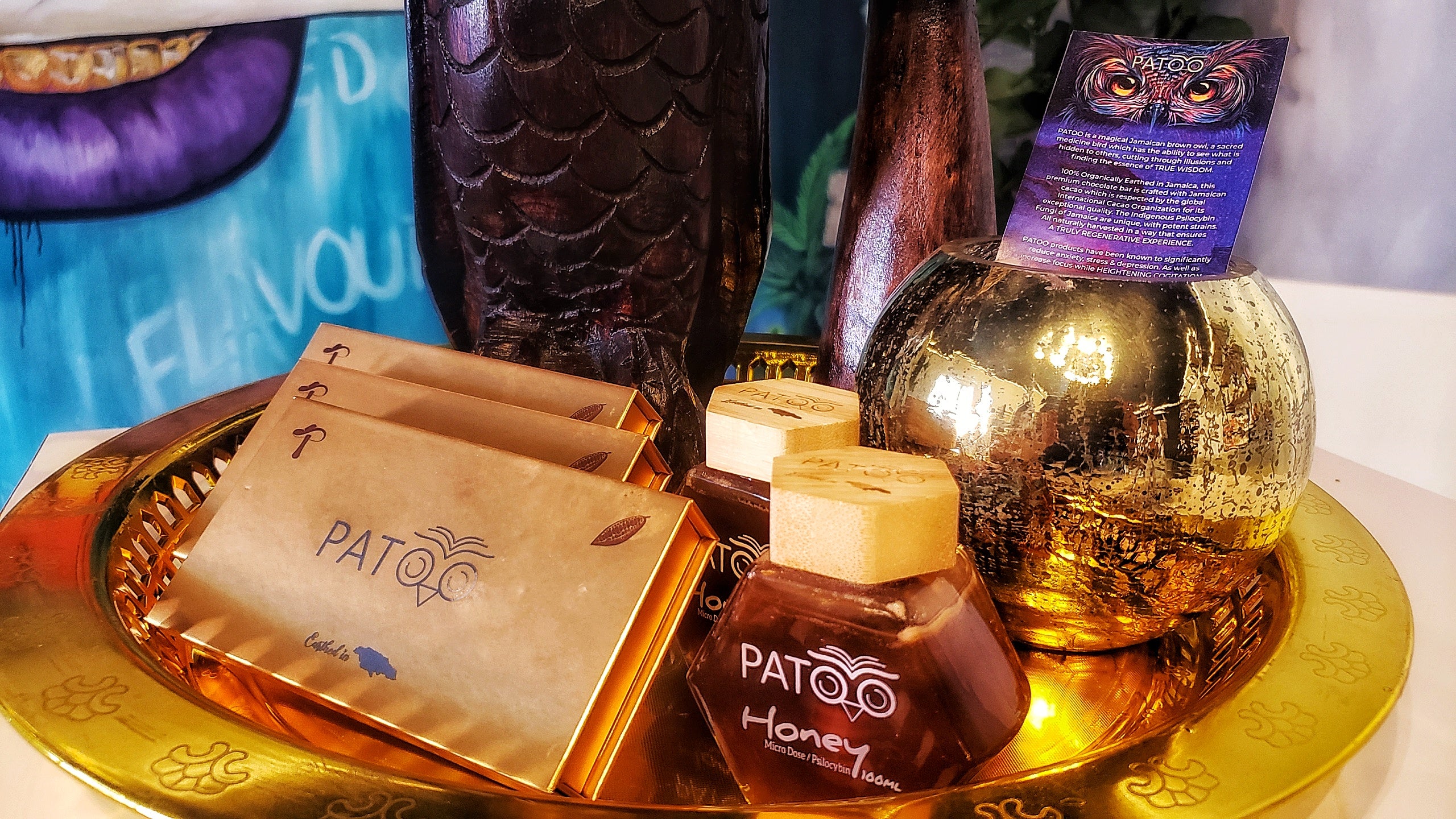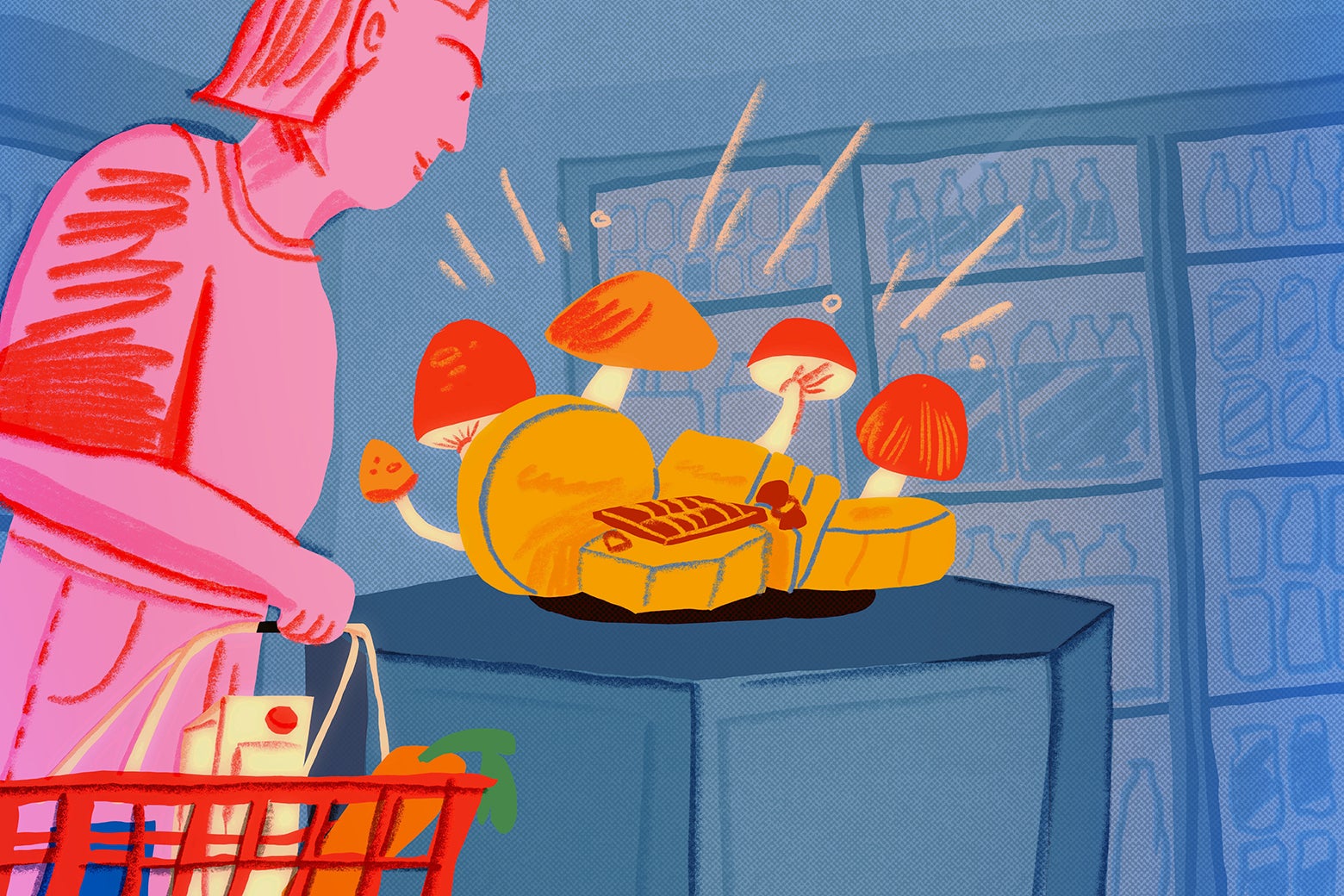This is part of Pour One Out, a series about what’s happening to America’s famous appetite for suds—and what’s taking its place.
The Rockhouse Hotel & Spa, a dramatically set clifftop resort in Negril, Jamaica, is known for maintaining its allure among celebrities. Bob Marley and Bob Dylan once hung out there. More recently, Meghan Markle called it her favorite place to chill and Bella Hadid credited it with reminding her how beautiful life is.
For the past two years, the Rockhouse has also had another distinction: Its gift shop will openly, legally sell you a magic mushroom chocolate bar. In June 2021, when it first added them to its inventory, it became one of the first stores that is not a drug dispensary to openly and officially sell a product containing psilocybin anywhere in the world.
The experience goes a little like this: You enter the shop and make your way past woven handbags, CBD oil, and Jamaican jerk sauce to the life-size sculpture of a Patoo, a Jamaican owl that the chocolate brand is named after. Flanking it are two thick, golden boxes the size of large Hershey bars, embossed with brown mushrooms and the word Patoo.
You ask the woman behind the counter if people often buy it.
“Yeah,” she says.
You then ask her if she has tried it.
“No,” she says, and the conversation ends there—though Kevin Bourke, the brand’s creator, says he offered shop employees a chance to try it themselves and provided a three-hour training where he taught them about “the history of psilocybin way back in ancestral origins,” as well as the “legal suppression” that led to it becoming a banned drug in most of the world. One place where psilocybin mushrooms aren’t banned? Jamaica.
If you look like you’re under 18, someone is supposed to request your ID, though this is the hotel’s policy, not the law. The clerk gets the chocolate out from the spot where it’s stored. You then put the $65 4-gram “journey” bar—enough to not only enhance your senses but also scramble your sense of reality for many hours—and the $25 0.7-gram “social dose” on your credit card, along with maybe a postcard. So long as you do not attempt to fly internationally with the chocolate that a pamphlet suggests could bring you euphoria, energy, and clarity, you will not have broken any laws.
Is making magic mushrooms as easy to buy as craft beer the dream, or the nightmare? This has become a pressing question far beyond Jamaica as laws and attitudes toward psilocybin evolve. Colorado, Oregon, and Canada recently legalized some uses of magic mushrooms. Similar proposals seem to have momentum in California, Washington, and Uruguay, among many other places. Buoyed by promising early research, scientists throughout the world are investigating psilocybin’s effectiveness in treating depression, PTSD, anxiety, and alcoholism, as well as in helping people quit smoking, among other benefits.
Large shifts in the way people consume and distribute psilocybin are also occurring in places that are a long way from explicit legalization. In New York City, some bodegas and smoke shops now sell psilocybin chocolate bars to those who know what to request. In Toronto and Vancouver, magic mushroom dispensaries with names like “Shroomyz” have proliferated. As Los Angeles magazine reported two years ago, “Soccer moms in Malibu now swap notes over microdosing (taking tiny amounts of psychedelics to boost moods and enhance creativity) as they recap the latest episode of Hulu’s Nine Perfect Strangers, a show in which characters engage in … microdosing.”
“Mushrooms have become pretty cool now; everyone wants to try them,” said Kynan Cooke, the owner of Psacred Therapeutics, one of the leading magic mushroom distributors in Jamaica. He believes that the pandemic spurred this shift; it messed with people mentally, and now they’re turning to psilocybin to work through stuff.
In some ways, the scene at the Rockhouse—and the 11 other hotels and 28 dispensaries that are now selling around 2,000 total Patoo chocolate bars a month—is an only-in-Jamaica situation. Amid all these shifts, the island nation is still one of the few places in the world where psilocybin, the mind-altering compound in magic mushrooms, is not regulated in any way. (Even the Netherlands prohibited the sale of psilocybin mushrooms in 2008 after an intoxicated 17-year-old who was suffering from mental health issues ate them and then jumped off a building in Amsterdam and died. Only truffles with psilocybin can now be legally sold.) But in other ways, it’s very much connected to a question that people are working through, privately and openly, legally and illegally, the world over: Should obtaining magic mushrooms resemble filling a prescription, seeing a therapist, going to a bar, or something else entirely?
Bourke, the creator of Patoo, thought he had an answer. In the early days of the pandemic, the Jamaican-born brand-builder, who’d spent years working as the head of marketing for Appleton, the Jamaican rum company, was doing some consulting for the cannabis industry and exporting magic mushrooms to researchers in Canada, and he couldn’t help but notice a broader surge in interest in shrooms. Not just among the hippie types he sometimes sold mushrooms to back in college in Canada, but also wealthy Jamaican housewives and businesspeople as well as wellness-minded Americans and Canadians. He believed in the power of psilocybin to heal and help people.
“We all have default networks, and when we drive the road of life, we go down the same road, the same paths,” Bourke told me. He said he found that psilocybin had a way of grading that road, removing the ruts, and—in his case—offering him a useful replacement for alcohol.
He also saw an opportunity.

Street vendors and weeklong psychedelic retreats offered mushrooms and edibles. But Bourke envisioned something different—a premium brand placed in high-end hotels. “People go into the gift shop early in the trip to buy suntan lotion, a hat, and browse,” he said. And there, they would find his product.
Bourke and his business partner were already experimenting with crossing strains and growing mushrooms at a farm that had previously made pasta for all-inclusive resorts. They found a chocolate partner and made their pitch to Paul Salmon, the chairman of the Rockhouse Hotel. It helped that they already knew each other. “The packaging was great,” said Salmon, who is from Australia and lives in New York City when he’s not in Jamaica. He knew his customers wanted magic mushrooms, and Bourke “was elevating the experience to a different level.”
Is this better than the Oregon model, in which anyone over 21 is permitted to consume psilocybin but cannot legally buy it? There, they have to purchase a supervised psilocybin experience from a licensed provider.
Justin Townsend, the CEO of MycoMeditations, one of the first psychedelic retreats in Jamaica, prefers a more careful model. He didn’t call out Patoo, but he said he doesn’t think that mushrooms or psilocybin edibles should be sold over the counter without clear standards and regulations.
“I would never sell mushrooms to anyone not on my retreat,” Townsend said. (In his weeklong retreats, the psilocybin comes as part of the $4,500–$23,000 package that people buy to have psychedelic therapists guide them through their journey.) He believes that using psilocybin for mental health requires a competent facilitator. Psilocybin is way more powerful than cannabis, Townsend said, but he fears that this may not be widely understood. He’s observed that psilocybin can bring trauma to the surface; individuals who have bipolar disorder or who have had previous psychotic episodes could experience mania or psychosis. “If you go in ignorance and eat it, the person can become destabilized,” he said.
In general, Townsend avoids giving people chocolate, offering up capsules instead, which he believes tend to be more reliable and standardized in terms of dosage. At minimum, there should be regulations about packaging to ensure it includes proper warnings and does not appeal to children, he said. (Bourke, who also offers facilitated retreats and capsules, said that his method of creating the chocolate ensures even distribution. The labels warn against use by anyone pregnant, breastfeeding, or under 18. “We’re aware of all of the side effects, and we’re delving into the medicine in a positive, ethical way and learning as we go,” he said.)
Townsend’s view is that even the Oregon policy is too lax, given that it’s possible for someone without any mental health background to become licensed as a psilocybin practitioner through classroom experience and just 40 hours of practice. “Frankly, it’s terrifying,” he said of the policy.
Mike Arnold, the CEO and founder of Silo Wellness, another company offering psilocybin retreats in Jamaica, has a different view. He is also concerned about psychosis and ensuring that the people guiding journeys are properly trained, but customers are already buying magic mushrooms to use on their own. “That ship has sailed,” he said, so it’s worth giving them decent, cost-effective options. The existence of Patoo is good not only for Bourke, but for everyone in this space, he believes. “I think any time that you have a brand, for some type of stigmatized anything, not only come in as a packaged legitimate brand, but also get sold in a high-end shop, that says to an industry: ‘Welcome, you have arrived!’ ” he observed.
Arnold, who is in the process of setting up what he hopes will be the largest legal magic mushroom retreat center in Oregon, said he is committed to abiding by the rules there. But he feels strongly that there should be a way for people to experience the benefits of mushrooms in the United States without paying for a supervised session or having friends who grow mushrooms. (Early rates at the first facility licensed in Oregon ranged from $500 to microdose in a group to $3,500 for a 4-gram guided trip, steep costs the provider blamed on fees that came with setting up her business. Colorado’s new law requires that people grow mushrooms themselves or gift them to each other until 2024, when supervised “healing centers” begin to open.)
All of this makes not only Patoo but also the $50 psilocybin sound bath that the Rockhouse offers seem like a bargain.
On a recent Sunday, a facilitator named Sativa handed out bits of Patoo chocolate to the 12 or so guests splayed on yoga mats in a wooden gazebo. Sativa asked people where they were from: Most hailed from Calgary, Canada, and had come to Jamaica to celebrate a friend’s 60th birthday. Another attendee worked at the Rockhouse Spa. (Employees, Bourke told me, are encouraged to attend. Salmon seemed surprised to hear that an employee participated in her uniform and said that employees are only supposed to attend on days off or once shifts have ended, out of uniform. A spokesman later wrote me to say that action had been taken to ensure that the employee understood the uniform rule.) After Bourke finished telling us about the history of psilocybin and all the places where we could buy Patoo products, Jeremy, the “sound alchemist,” took over, playing soothing music as Sativa reminded us to breathe.
Later I asked the Calgary crew what they thought. Their main complaint was that they hadn’t felt anything. Maybe they hadn’t given it enough time. Or maybe they hadn’t eaten enough. Either way, they knew where to easily buy more.
